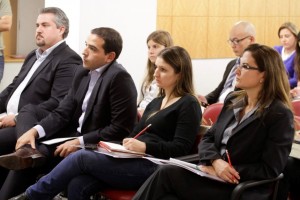Debates encourage evaluation of the impact of the Anti-Corruption Law for companies
The approval of the Anticorruption Law has fostered a series of discussions about the impact of the decision for Brazilian companies and the benefits that the whole society will have with the possibility of holding corporations - and not just individuals - accountable in cases of corruption.
 On September 17, lawyer Lanny A. Breuer gave a lecture at Fundação Getulio Vargas Law School, in São Paulo, with the support of ETCO. The event addressed the impact of the law on Brazilian and international companies that invest in Brazil.
On September 17, lawyer Lanny A. Breuer gave a lecture at Fundação Getulio Vargas Law School, in São Paulo, with the support of ETCO. The event addressed the impact of the law on Brazilian and international companies that invest in Brazil.
Head of the Criminal Division of the U.S. Department of Justice between 2009 and 2013, Lanny A. Breuer was named by the National Law Journal as one of the 100 most influential lawyers in the United States and specializes in issues related to public corruption, money laundering, fraud financial crime, cyber crimes and intellectual property.
Despite having little familiarity with Brazilian law, Breuer recognized the importance of approving the project. According to him, dealing with public integrity, one of the functions of the US Department of Justice, is a big responsibility. "The laws against corruption are always strong, just apply them," he said.
The lawyer considered, however, that the creation of compliance departments in companies due to new legislation cannot be restricted to a single area of the company. "Compliance cannot be just an item to be crossed out on a list," he said.
For Breuer, finding and combating cases of corruption must be a priority for all countries, including the United States and Brazil. “One of the reasons that led to the Arab Spring in the Middle East was corruption. Younger people no longer accept this and saw an opportunity to make things better, ”he said.
"Good will"
On September 27, the Brazilian Institute of Corporate Governance (IBGC) promoted a debate that also addressed the Anti-Corruption Law. The need to change the behavior of companies, and not just the creation of compliance areas, was discussed among the participants.
For lawyer Leonardo Machado, from Machado Meyer Sendacz and Opice, the popular demonstrations registered since June anticipated the approval of the law. “This type of legislation does not come by chance. It was a negotiation between those who have good will and good faith against those who had no interest, ”he said.
According to him, the Comptroller General of the Union (CGU) is preparing a decree that will say what is a compliance program structured for the Brazilian reality.
According to Juliana Breno, Manager of Forensic Services at PriceWaterhouseCoopers, there is still a great deal of skepticism on the part of companies regarding the Anti-Corruption Law. “As long as there is no severe punishment, there will be this feeling of impunity. Compliance must add value, it must happen in practice. ”



